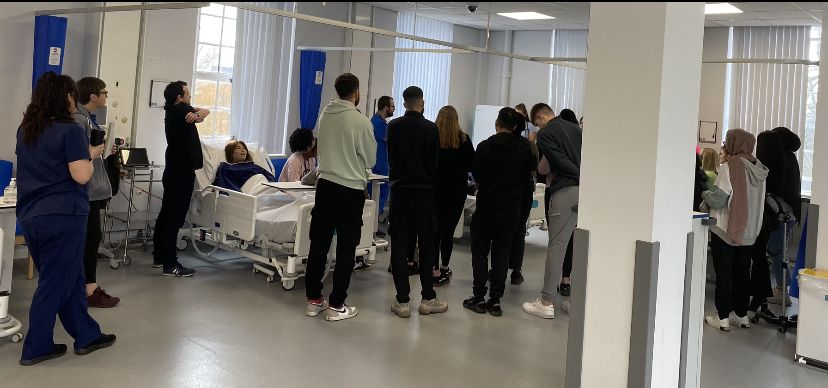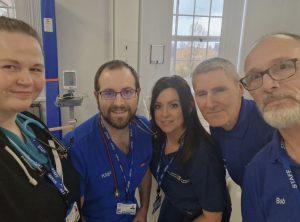In the demanding landscape of healthcare, where stress and burnout loom large, mindfulness emerges as a vital tool for resilience and renewal. Mindfulness, characterized by intentional presence in the present moment with an open heart and non-judgmental awareness, offers healthcare professionals a transformative ally in navigating their challenging journey with clarity, compassion, and steadfastness.
The pressures of the healthcare profession are immense, marked by gruelling schedules, high-stakes decisions, and relentless expectations for flawless care. In this crucible, it’s all too common for healthcare providers to feel overwhelmed, leading to stress, anxiety, and compassion fatigue. However, mindfulness serves as a powerful remedy in this chaos, providing a host of benefits that extend well beyond individual well-being, profoundly influencing patient care and outcomes. Chief among these benefits is stress reduction. Through consistent mindfulness practice, healthcare professionals develop a keen awareness of their internal and external stressors, enabling them to respond with resilience even in the face of adversity.
Research consistently demonstrates the effectiveness of mindfulness-based interventions in alleviating stress, anxiety, and burnout among healthcare providers, ultimately enhancing job satisfaction and overall wellness. Moreover, mindfulness cultivates self-awareness and emotional intelligence, empowering healthcare professionals to navigate their inner landscape with grace.
By fostering a non-judgmental awareness of their thoughts, emotions, and bodily sensations, healthcare providers deepen their capacity for empathy and compassion towards themselves and their patients. This heightened empathy enriches therapeutic relationships and leads to improved patient outcomes and satisfaction.
Furthermore, mindfulness enhances clinical effectiveness by sharpening focus and attention during patient interactions, improving communication, diagnostic accuracy, and treatment adherence. Mindfulness-based interventions also contribute to a reduction in medical errors and better clinical decision-making, enhancing the quality and safety of patient care.
Integrating mindfulness into healthcare settings requires minimal time and specialized training. Simple yet profound practices like mindful breathing and meditation can be seamlessly incorporated into daily routines, providing moments of calm amidst the chaos.
Additionally, tailored mindfulness programs catered to the specific needs of healthcare professionals offer opportunities for deeper exploration and skill refinement. As healthcare organizations increasingly prioritize staff well-being, mindfulness emerges as a cornerstone in fostering a culture of wellness and compassion.
By investing in mindfulness training and resources, healthcare institutions create supportive environments that benefit both patients and providers. In embracing mindfulness, healthcare professionals embark on a journey towards greater well-being, resilience, and clinical effectiveness, enriching the lives they touch and the care they provide. Let us embrace mindfulness as a catalyst for healing and transformation as we navigate the complexities of modern healthcare.
As well as working in my capacity as an Associate Clinical Educator, I facilitate a weekly online meditation session every Tuesday evening. What sets this meditation group apart is its distinctive approach—it’s characterized by a lack of pretension, and we often find humour in our shared experiences, frequently directed at me. This unique dynamic, which I take pride in, serves as a constant reminder to maintain a balanced and grounded perspective, emphasizing the importance of navigating life with a sense of lightness and avoiding undue attachment to rigid ideas and beliefs.
Recognizing the common human inclination towards seeking answers and a roadmap for a fulfilled life, I’ve formulated an 8-fold path—a practical framework for regular self-reflection and mindfulness. This framework is not intended as a rigid set of rules but rather as flexible guidelines drawing inspiration from diverse sources, fostering adaptability.
1. Cultivate Mindful Awareness: Regular meditation practice becomes a cornerstone for honing focus and attention. Extending mindfulness to everyday life allows for direct experiences and the development of control over impulsive reactions. Employing sensory acuity, activating all five senses, creates a heightened connection with the external world.
2. Embrace Open-Mindedness: Encourage a genuine openness to new ideas. Navigate discomfort by examining its physical manifestations, challenging existing beliefs, and considering alternative perspectives. The ability to discard beliefs after thorough examination is emphasized, recognizing the transient nature of thoughts.
3. Promote Adaptability: Embrace flexibility by adjusting strategies when faced with challenges or setbacks. Introducing novel challenges disrupts routines, expanding behavioural choices and emphasizing the value of maintaining a variety of options.
4. Cultivate Resilience: Frame setbacks as valuable feedback rather than failures. Embrace the understanding that every experience provides lessons for growth. Encouraging self-compassion and focusing on continuous improvement fosters resilience.
5. Practice Pragmatism: When confronted with unexpected outcomes, adopt a pragmatic mindset. Evaluate the situation and consider, “What would be the most useful thing to do now?” Prioritizing practical actions over dwelling on unmet expectations promotes effective decision-making.
6. Embody Responsibility: Through a combination of pragmatism and resilience, take responsibility for one’s actions and their broader impact on others. Living in the moment allows for a comprehensive assessment of the consequences of one’s choices. Regularly ponder, “How will my actions affect those around me?”
7. Foster Creativity: Engage in imaginative exercises to generate innovative ideas and solutions. Set aside dedicated time to combine three unrelated concepts, observing the emergence of novel insights. Nurturing creativity contributes to personal and collective growth.
8. Sustain Curiosity: Retain a sense of curiosity as a driving force for personal development. Explore new literature, ideas, skills, and languages. Approach doubts with a curious mindset, asking, “What would happen if this worked out?” Acknowledge the transformative potential of small changes on personal and interpersonal levels.
Experiment with integrating these principles into daily life, observing their impact. As with ripples from a pebble in a pond, recognize that even subtle changes in personal behaviour can have a meaningful influence on those in your educational and clinical spheres.
Explore the Transformative Power of Mindfulness!
Are you eager to unlock the potential of mindfulness and witness its profound impact on both your personal journey and the lives of those around you? Look no further!
Join us for an enlightening two-hour online workshop dedicated to delving deep into the power of mindfulness on Sunday 19th May 2024 10:00 – 12:00 BST or Wednesday, 22 May 2024 10:00 – 12:00 BST.
Workshop Highlights:
- Gain Insight: Discover how mindfulness can revolutionize your daily life, fostering clarity, resilience, and inner peace.
- Practical Techniques: Learn invaluable mindfulness practices that you can seamlessly integrate into your routine, enhancing your well-being and relationships.
- Interactive Sessions: Engage in thought-provoking discussions and activities designed to deepen your understanding and experience of mindfulness.
- Expert Guidance: Benefit from the wisdom and expertise of seasoned mindfulness practitioners who will guide you every step of the way.
Don’t miss out on this incredible opportunity to embark on a transformative journey towards a more mindful existence! Click on the link below to go to our page on Eventbrite to book your place. See you at the workshop!



 The Independent Prescribing Course is a medical education program designed to equip healthcare professionals with the necessary skills and knowledge to prescribe medication independently. This course is typically intended for healthcare professionals such as pharmacists, nurses, physiotherapists and optometrists who are required to prescribe medication as part of their professional responsibilities.
The Independent Prescribing Course is a medical education program designed to equip healthcare professionals with the necessary skills and knowledge to prescribe medication independently. This course is typically intended for healthcare professionals such as pharmacists, nurses, physiotherapists and optometrists who are required to prescribe medication as part of their professional responsibilities.